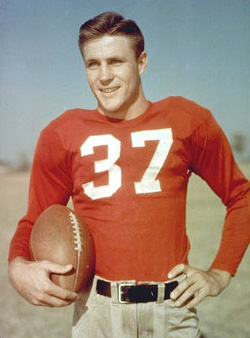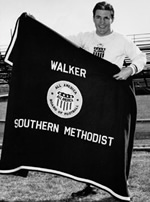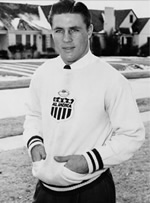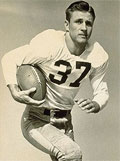About Doak Walker

Doak Walker epitomized leadership, sportsmanship, and academic and athletic achievement during his storied career at SMU in the late 1940's. Gracing the covers of numerous national magazines, "the Doaker" was a national phenomenon.
The versatile Walker, who also punted, returned punts and kickoffs, and kicked extra points, earned All-America honors in 1947, 1948 and 1949. After starting as a freshman in 1945, he missed the 1946 season due to his service in the Army; however, by his junior season, his exploits on the field had become legendary, and in 1948, Walker won the Heisman Trophy.
Because of extraordinary fan interest in Walker, who led the Mustangs to Southwest Conference championships and Cotton Bowl appearances during the 1947 and 1948 seasons, SMU moved its home football games from campus to an expanded Cotton Bowl. The Cotton Bowl recognized Walker's achievements with a plaque at its main entrance that reads: "The Cotton Bowl, the House that Doak Built."
Walker received his degree on schedule before reporting to the Detroit Lions for his rookie season in 1950. As a rookie, he led the NFL in scoring with 128 points. During his six years with the Lions, he led the team to NFL Championships in 1952 and 1953 and was named All-Pro four times. He was inducted into the College Football Hall of Fame in 1959 and the Pro Football Hall of Fame in 1986. Prior to the 2000 season, Walker's jersey number 37 was the sole number in the history of SMU athletics to be retired.
On September 27, 1998, 50 years to the day after appearing on the cover of Life Magazine, Walker passed away due to complications from a skiing accident.
Highland Park High School
Doak Walker was a 1944 graduate of Highland Park High School located in Dallas, Texas. He was a standout running back at the school, before attending nearby SMU beginning in the fall of 1947.
SMU

In an euphoric postwar era that passionately believed in heroes, America readily adopted the unpredictable Mustangs, who befuddled opponents with their wide open, pass-oriented attack, then graciously complimented their victims in a then-customary display of sportsmanship.
The 5-foot-11, 173-pound Texan was the first junior to receive the Heisman Trophy, which he won in 1948 while at SMU, in Dallas. He had won the Maxwell Trophy as a sophomore.
"Having Doak on our team was like having loaded dice or marked cards. We just felt like we had to do our part and Doak would do the rest. The most amazing thing is that he did it all so effortlessly. He made it look so simple." - Francis Pulattie
Cotton Bowl

Later, the Cotton Bowl recognized Walker's achievements with a plaque at its main entrance that reads, "The Cotton Bowl, the House that Doak Built."
Detroit Lions
Doak Walker received his Bachelor of Science degree on schedule from SMU before reporting to the Detroit Lions in 1950 when he led the NFL in scoring as a rookie with 128 points -- the second most in NFL history at the time. In his six years with the Lions, he led the team to NFL championships in 1952 and 1953 and was chosen All-Pro four times. He was inducted into the College Football Hall of Fame in 1959 and the Pro Football Hall of Fame in 1986.

How many times have we heard athletes say they want to retire at the top of their game? Every year -- and often by the same people. Right up until they are politely asked to take their eroded skills into the coaching or broadcasting booth. Not Doak Walker. He walked away from the glamour, glory and good times of professional football after just six seasons, still in his prime and with his services still in demand.
"I'd been on three division champions and two world champions. I'd been to five Pro Bowls and made All-Pro four times," he told the Detroit News' Jerry Green in 1986. "What else was there to do?"
It took Walker a career to gain what Barry Sanders gets in a season -- 1,520 yards rushing. But remember, he was playing for 'T' formation teams which used quarterback Bobby Layne, no ox as a runner, behind center with three backs crossing the 'T' right in back of him.
With limited work, Walker averaged 4.9 and the most he ever rushed for in a season was 386 yards (on 83 attempts) his rookie year. But in three of his six seasons he was above 500 yards receiving and two others were above 400. He caught 152 passes for 2,539 yards, averaged 39.1 yards as a sometimes-punter (50-1,955) and kicked 49 field goals. As an infrequent return man, Walker ran back 38 kickoffs 968 yards (25.5 average) and 18 punts 284 yards (15.8 average).
Walker's specialty was the scoreboard. He totaled 534 points, twice winning the NFL scoring title, and a figure that still ranks third on Detroit's career scoreboard. In just six seasons he kicked enough extra points, 183, to place third on the team list.